第2回講演会「エピジェネティック療法の現在と未来」

- 日程
- 2011年6月9日(木)
- 会場
- 国際文化会館 岩崎小彌太記念ホール
- 来場者数
- 38名
- 講演内容
-
-
特別講演1
「Epigeneticと癌 〜治療標的同定を目指して〜」
山下 継史氏(北里大学医学部外科学講座・講師)座長: 佐谷 秀行(慶應義塾大学大学院医学研究科 先端医科学研究所
遺伝子制御研究部門 教授) -
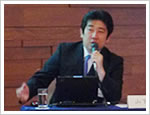
癌における epigenetic な異常は癌の悪性形質に極めて強い影響を与える遺伝子変化を惹起し、その特徴を科学的に説明する突破口となります。われわれは、悪性度の高い癌が epigenetic な異常に起因して生じているという仮定のもとに、そのような遺伝子異常を新規同定し、分子標的点を明らかにする目的で研究をおこないました。同定した遺伝子HOPX, NEFH は共通の特徴として、(1)癌組織で50%以上のメチル化を有し、(2)対照粘膜組織で20%以下のメチル化しか示さず、(3)正常組織での発現が癌組織において劇的に低下し、(4)足場非依存性増殖を著明に抑制し、(5)臨床的に悪性予後と相関する遺伝子というものでした。これらの遺伝子は、Erk-AP-1 あるいは PTEN-Akt に影響を及ぼすことが明らかになりました。これらは癌の治療標的および epigenetic 治療における重要なバイオマーカーとなる可能性を有すると考えられます。
-
特別講演2
「エピジェネティック療法の実際 〜脱メチル化薬を中心に〜」
安藤 潔氏(東海大学医学部血液・腫瘍内科・教授)座長: 佐谷 秀行(慶應義塾大学大学院医学研究科 先端医科学研究所
遺伝子制御研究部門 教授) -
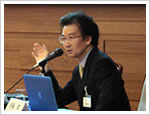
わが国で初めてのエピジェネティック治療薬となる5-アザシチジン(商品名:ビダーザ)が本年3月に発売となり、いよいよがん治療のエピジェネティック療法時代がスタートしました。DNAメチル化による癌抑制遺伝子の発現抑制が癌の発症に関わっています。脱メチル化薬である5-アザシチジンはこのメカニズムを標的としており、骨髄異形成症候群だけでなく多くの癌に有効性が期待されます。本講演では、骨髄異形成症候群や白血病の分子病態を概説し、5-アザシチジンの海外および国内臨床試験の結果を解説したほか、実際に使用症例も紹介しました。
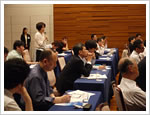
講演で紹介された、日本初エピジェネティック治療薬について、臨床現場の先生方から実際の使用方法などに関する質疑がありました。今後バイオマーカーをいかに見つけていくかが、薬を有効につかうステップだという安藤氏のコメントがありました。
- パネルディスカッション
-
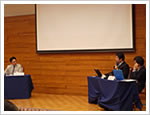
講演後、座長、2人の講師、また会場を交えてのパネルディスカッションがありました。標的にする遺伝子の解明や、分子標的薬を含む抗がん剤との組合せなど、エピジェネティック治療薬が、がん治療にもたらす可能性について活発な意見交換がありました。座長の佐谷先生からも、現在エピジェネティックの全容を解明する研究が進んでおり、基礎研究の分野においても夢のある時代に突入していると、今後のエピジェネティック療法研究会への期待を語りました。
- 懇親会
-
その後、場所を移して懇親会が行われました。参加者同士、また講師と参加者の方との、なごやかな交流の場となりました。

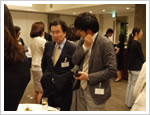

-
The 2nd symposium "The present and future of epigenetic therapy"
- Lecture
-
-
Special lecture 1
"Epigenetics and cancer -towards the identification of therapeutic targets-"
Lecturer: Keishi Yamashita (Assistant Professor, Department of Surgery, Kitasato University School of Medicine)
Chairman: Hideyuki Saya (Professor, Division of Gene Regulation, Institute for Advanced Medical Research, Keio University Graduate School of Medicine)
-

Epigenetic abnormalities in cancer cause genetic changes that very strongly affect the malignant phenotype of cancer, and their identification has provided a breakthrough to scientifically explain the characteristics of cancer cells. We conducted a study to newly identify such genetic abnormalities and to clarify molecular target points, under the assumption that highly malignant cancers are caused by frequent epigenetic abnormalities. The genes thus identified, HOPX and NEFH, had the following common characteristics: (1) methylation level of more than 50% in cancer tissue; (2) methylation level of 20% or less in control mucosal tissue; (3) dramatically downregulated in cancer tissue as compared with in normal tissue; (4) markedly suppressed anchorage-independent growth and anti-apoptotic ability; (5) clinically correlated with the prognosis. These genes were revealed to affect Erk-AP-1 or PTEN-Akt pathway critical for cancer progression. It is considered that these genes may become therapeutic targets in cancer and serve as important biomarkers in epigenetic therapy.
-
Special lecture 2
"Epigenetic therapy for hematologic malignancy: 5-Azacytidine"
Kiyoshi Ando MD (Professor of Medicine, Department of Hematology and Oncology, Tokai University School of Medicine)
Chairman: Hideyuki Saya (Professor, Division of Gene Regulation, Institute for Advanced Medical Research, Keio University Graduate School of Medicine)
-

5-Azacytidine (Vidaza), the first epigenetic drug marketed in Japan, was launched in the market in March this year, finally introducing the era of epigenetic therapy in cancer treatment. Inhibition of tumor suppressor gene expression by DNA methylation is involved in cancer development. A demethylating agent, 5-azacytidine, targets this mechanism, and is expected to be effective not only for the treatment of myelodysplastic syndrome, but also of many cancers. This lecture reviewed the molecular pathogenesis of myelodysplastic syndrome and leukemia, and the results of clinical trials of 5-azacytidine, and introduced clinical cases used this agent for treatment.

Physicians in clinical practice asked questions about how Japan's first epigenetic drug must actually be used, which was introduced in the lecture. Professor Ando commented that a key step to using this agent effectively would be identification of useful biomarkers for this drug in the future.
- Panel discussion
-

After the lectures, a panel discussion was held among the Chairman, 2 speakers and symposium participants. Opinions were actively exchanged on the possibilities brought about by epigenetic drugs in cancer treatment, such as the elucidation of the genes to be targeted and combined treatment with anticancer drugs, including molecular-target drugs. The chairman, Professor Saya, talked about future expectations for the Epigenetic Therapy Study Group, saying that studies elucidating the whole picture of epigenetics are currently in progress and that the field of basic research has also entered a dream era.
-







